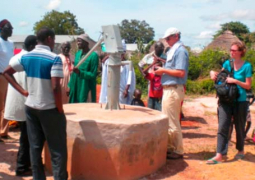There
is consensus among Muslim Scholars that Hajj is obligatory only once during the
lifetime of a Muslim, unless someone vows to perform extra Hajj, in which case
he must fulfill his vow. Whatever is done over and above is supererogatory or
optional.
Abu
Hurairah narrates that once, in a sermon, the prophet (peace be upon him) said:
“O people! Allah has prescribed Hajj for you, so you must perform it.” A man
asked: “Every year, O Prophet of Allah?” The Prophet (peace be upon him)
remained silent. When the man repeated it thrice, the Prophet (peacebeupon him)
said: “had I said ‘yes’, it would have become a yearly obligation, and this
would have been beyond your power.” Then he added: “leave me alone so long as I
leave you alone (i.e., do not pester me with questions about things which I
omit and do not mention). Some people who lived before you were destroyed
because they ask too many questions and disagreed with their Prophets. So when
I command you to do something, you must obey and do it to the best of your
power, and if I forbid you from something, then avoid it.
Ibn
Abbas narrates that once the Prophet (peace be upon him) addressed us and
said: “O People! Hajj has been
prescribed for you.” At this Al-Aqra bin Habis stood up and asked: “O Prophet
of Allah! Are we to perform Hajj every year?” the Prophet (peace be upon him)
said: “had I said yes, it would have become a (yearly) obligation, and had it
become a yearly obligatory duty you would have failed to keep it. Hajj is
obligatory only once in one’s lifetime. Whatever one does over and above this
is supererogatory (a voluntary act) for him.
CAN
THE PERFORMANCE OF HAJJ BE DEFERRED TO A MORE CONVENIENT TIME OR MUST IT BE
PERFORMED IMMEDIATELY AFTER ONE IS ABLE TO DO SO?
Ash-Shafi’y,
Ath-Thawry, Al-Awa’y and Muhammad bin Al-Hassan are of the opinion that Hajj
may be performed at any time during one’s life, and there is nothing wrong if
someone for whom it is obligatory, delays it until a later date in his or her
life, for although Hajj was prescribed in the 6th year of Hijrah, the Prophet
(peace be upon him) delayed it until the 10th year of Hijrah when he performed
it along with his wives and many of his companions. Had performing it earlier
been essential the Prophet (peace be upon him) would have never delayed it.
Ash-Shafi’y
says: “We therefore, are convinced that Hajj is obligatory upon a Muslim, male
or female, from the age of puberty until before his death. Abu Hanifah, Malik,
Ahmed, some of Ash-Shafi’y’s followers and Abu Yusuf are of the opinion that
Hajj must be performed as soon as one is (physically and financially) in a
position to do so. This opinion is based on a hadith that is related by Ibn
Abbas that the Prophet (peace be upon him) said: “He who intends to perform
Hajj let him do so expeditiously, for he may well fall sick, may lost his mount
(ability to bear expenses of the journey) or he may be prevented by some other
exigency.” In another report by Ahmed and Al-Baihaqy, we read that the Prophet
(peace be upon him) said: “Hasten to you” meaning “One may fall sick or be
prevented by some other exigency.” The earlier scholars interpreted these
hadith saying it was commendable for a person to perform Hajj as soon as
possible provided he had the ability to do so
PREREQUISITES
FOR HAJJ
There
is a consensus among jurists concerning the prerequisites that must be found in
a person for Hajj to be incumbent on him:
He
must be a Muslim.
He
must be an adult.
He
must be of a sound state of mind.
He
must be free.
He
must have the necessary power and ability.
Anyone lacking any of these conditions is not
obligated to perform Hajj. All these conditions that is, being a Muslim, being
of adult age and of sound mind, being free, and possessing the power to
discharged a duty are equally valid with respect to all other forms of worship in Islam. This
is based on a hadith of the Prophet (peace be upon him) which says: “Three persons
are not to be held accountable: a sleeping person until he awakes, a minor
until he comes of age, and a mentally disturbed person until he regains his
reason.” Freedom is an essential prerequisite for Hajj, for this worship needs
time as well as financial ability. A slave lacks both, for all his time is
spent in the service of his master, and financially he lacks the ability to
undertake this obligation. The Qur’an says, “Hajj (pilgrimage to Mecca) to the
House (Ka’bah) is a duty that Mankind owes to Allah those who can afford the
expenses (for one’s conveyance, provision and residence).
The
Ability To Perform Hajj – What Does It Imply?
The ability to perform Hajj, which is one of its essential conditions, includes the following:
1.A person must be healthy and physically fit. If one is disabled by old age or a disease that is incurable or is unable to perform Hajj for some other similar reason, he may, if he is financially capable, assign someone else to perform Hajj on his behalf and at his expense. This will be discussed later under “Hajj On Behalf of another Person.”
2.The
journey to Hajj must be safe so that the pilgrim’s life and possessions are
safe and secure from any danger. If one is afraid for one’s life from
highwaymen or an epidemic or if one is afraid to be robbed of one’s
possessions, then such a one is deemed as one of those who cannot afford the
journey for Hajj.
There
is, however, a difference of opinion among scholars regarding the entry fees
and other charges levied on pilgrims. Can a person be excused and reckoned as
unable financially to perform Hajj because of these charges? Ash-Shafi`y and
others are of the view that the presence of these levies does qualify a person
to be classified as unable to perform Hajj, even though the levy involved may
be paltry. The Maliky scholars disagree for they do not regard this as a
sufficient reason for a person to be deemed as unable to perform Hajj, unless
the amount involved is too exorbitant or is demanded repeatedly.
3.One
must possess the necessary provision and also the requisite means of journey.
Necessary provision here means that the intending pilgrim must have sufficient
supplies for himself as well as for his family that he leaves behind. These
supplies include sufficient and adequate clothing, housing, means of traveling,
and tools for the pursuit of his trade or profession besides the financial
means for the journey. Means of traveling imply that which enables him to go to
Hajj and come back, whether it is by land, by sea, or by air. This concerns
those who live far from Mecca and cannot walk there.
To
be continued
Read Other Articles In Article (Archive)




